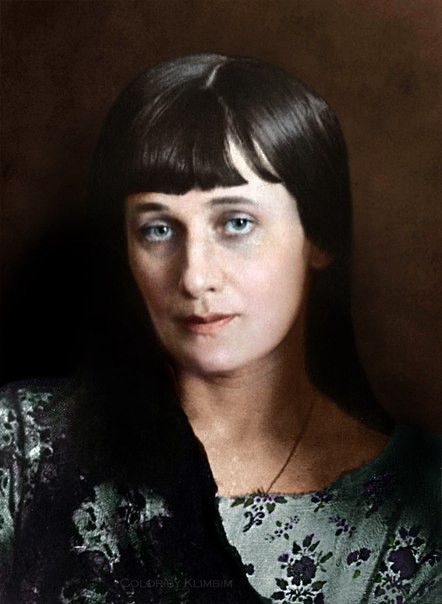“Not under foreign skies protection
Or saving wings of alien birth –
I was then there — with whole my nation –
There, where my nation, alas! was.”
These are the starting lines of Anna Akhmatova’s widely famous poem “Requiem”. The Soviet-Era poet Anna started writing this poem in the 1930s, which was not published until the 1960s. But before we dive deeper into the background of her amazing poetic career, let’s have a little glimpse of the poet’s life.
Anna Andreyevna Gorenka was born in Odessa, Ukraine, in 1889 to an upper-class family. Gorenka grew up in Tsarskoe Selo or the Tsar’s village, a glamorous suburb of Saint Petersburg, where she lived most of her life. Tsarskoe Selo is a city of opulent royal summer residences and of splendid mansions belonging to Russian aristocrats. This was the place where Anna met the poet Nikolai Stepanovich Gumilyov. In 1910, after years of a collaborative relationship around poetry, she married Gumilyov. The couple spent their honeymoon in Paris, where Akhmatova met Amedeo Modigliani, an Italian painter. They fell in love with each other and eventually, it became the most extraordinary relationship in Akhmatova’s life. Gumilyov and Anna got a divorce in 1918, three years before Gumilyov was executed by the Bolsheviks.
The Poetic Journey of Akhmatova and the “Requiem”
Anna started writing verses in her teen years using her real name. Eventually, she took the pseudonym Akhmatova following her family lore. Khan Akhmat, one of her maternal ancestors, was the last Tatar chieftain to accept tribute from Russian rulers. According to her ancestors, he belonged to the royal bloodline of Genghis Khan.
Akhmatova published her first collection of poems “Evening” in 1912 which made her famous at the first instance. Her next collections “Rosary” and “While Flock” made her one of Russia’s leading poets during the period preceding the October Revolution.
Anna Akhmatova started writing “Requiem” in the 1930s. “Requiem” is one of her most revered poems. It was the regime of Stalin. Printing presses were losing their freedom and government censorships were becoming the new normal for any creative work that would raise questions against his ruling system.
The main theme of the poem reflected the debilitating social prejudice and rise of totalitarianism in Russia under the rule of Stalin. The October Revolution of 1917 became a defining period for the country as the Bolsheviks seized control of the country. By 1924, Stalin rose to power with his totalitarian rule. He established infamous gulag prison labor camps across Russia. Dissenters including poets, artists, and writers were arrested and imprisoned in these camps.
The poets and writers from the pre-Revolution era including Akhmatova were censored as their works often reflected revolt and protest against the dictatorship of Stalin. They were kept under constant surveillance by the government to prevent any possible protest movement. Even under such threat and surveillance, Akhmatova kept on writing about the suffering of the common Russian people under the oppression of the government.
After 1917, Akhtamova’s fellow writers and artists opted out and went into exile in the West. She, however, decided to stay in Russia and safeguard her and her country’s pride and prejudice. As she wrote in one of her poems:
“But to me the exile’s always wretched,
Like a convict, or a patient.
Wanderer your road is dark,
And the bread of strangers tastes bitter.
But in the blinding smoke, the flames,
Destroying the remains of youth,
We have refused to evade
A single blow against ourselves.”
Following the publication of the second edition of Anno Domini MCMXXII in 1923 she found herself increasingly subject to censorship, and in 1946 she was banished from the Soviet Writers’ Union post the infamous speech by Andrey Zhdanov, a cultural leader of the Communist Party, in which he described her as “a cross between a nun and a whore”.
She had to face the consequences and go through too much personal hardship after she decided to remain in Russia. In 1921, the state executed her former husband Gumilyov on a fabricated charge, arrested her third husband, Punin, and imprisoned her only son, Lev in the gulag prisons.
Even after a prolonged poetic silence, she composed Requiem, her brilliant verse in solidarity with the victims of the unjust Stalinist purges.
Requiem was written between 1935 and 1940. The poem was inspired by the arrest of her and Nikolay Gumilyov’s son Lev in 1938 and his subsequent trial and sentencing. The poem was narrated from the perspective of a mother whose son is imprisoned for political resistance against the dictatorship of Stalin and the state. The poem was about the everyday torment and sorrow of the mother waiting for her son outside the prison. The poem also gave voice to all the common people in Russia who were suffering from the same physical and emotional trauma.
The censorship of Akhmatova’s work was slowly removed after Stalin’s death in 1953. Her new selection of poems, titled The Course of Time, was published in 1958.
Requiem was published abroad (tamizdat), where the poem continued circulating underground. The censorship and the hovering suppression on the publication of poems made it more significant. It slowly eradicated the legitimacy of the regime. It was in the 1980s when Akhmatova was officially rehabilitated by Mikhail Gorbachev, one year before the Soviet Union ceased to exist. Requiem was published in the same year.
A Forever Legacy…
Akhmatova believed that it is the intrinsic courage present in the heart of each individual that can help bring change in society. She believed in the power of culture, the freedom of expression, and the courage to speak out fearlessly against authoritarian rulers to safeguard the country’s essence in times of need.
She died in Moscow in 1966 leaving behind a legacy of courage and love.

